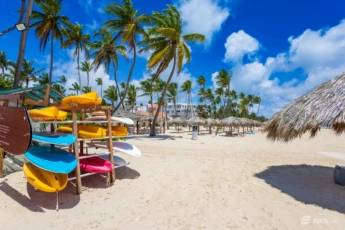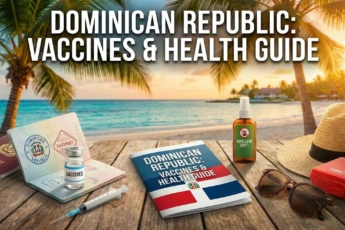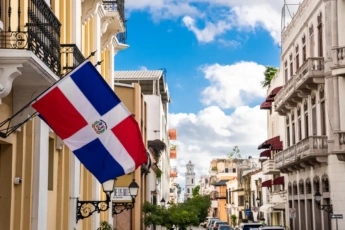11 Tips for Travelling to Punta Cana
After COVID-19 to Be Safe
Is it reasonable to not go on vacation after the coronavirus outbreak? How can we travel without fear that the coronavirus is everywhere? Right now when the pandemic is in full swing, a good rest is impossible. But let’s look into the future, at the world after the coronavirus, which is sure to come. Vacations to popular destinations such as the Dominican Republic will become available sooner or later. So, we have decided to prepare some very important tips for travelling to Punta Cana after the COVID-19.
In almost any society, tourism is part of a normal life. Obviously, people will be very happy to be able to travel again. How much they can afford pends on how much they are affected by the economic crisis that is the consequence of the coronavirus pandemic. But in general, the need to catch up in terms of tourism will be very high.
Although it is difficult to predict whether people will travel as before, or whether a lot of them will draw certain conclusions for themselves, the current discussion in the tourism industry is about how to make it better. Travel agencies, partners in the regions are now taking the time to make their offerings greener if finance allows. If there is a chance to reorient the tourism industry and change the tourism product, now is the best moment to do so. But whether we’ll or won’t at least partially abandon mass tourism after COVID-19, as we know it today, is not known yet.
The best option to travel after the pandemic is to ride your own car as far away as you can. However, going not to the nearest cities and countries, it will be necessary to use the plane, and there is no way to avoid a large number of neighbors. For this case, we have some useful tips for travelling to Punta Cana after pandemic:
1. Choose less popular flights
Usually, airlines put minimum price tags on those flights that are filled the worst.
2. Fly on a direct flight
Remember that two planes are twice as many potentially dangerous passengers, plus all those people you’ll meet at the airport connection. Direct flights are usually more expensive, but your own calm and health is invaluable!
3. Choose a seat at the window
On the one hand, at the end of the salon, there are always more motions, because there are toilets for economy class, so the first rows should be calmer. On the other hand, according to the statistics, most passengers prefer to sit in the “nose” of the plane, so that when the flight is not fully filled, the “tail” remains free.
Besides, the last row is chairs with undisturbed backs, where the likelihood to meet other passengers is the lowest. One thing is known for sure – the places at the window will be safer than anywhere else. So decide what’s more important to you (absence of neighbours or passing people) and make choices based on your priorities.
4. Disinfect everything around you
Immediately after getting on the aircraft, disinfect armrests, hinged table, and monitor. Look at your neighbors if they have any clear signs of SARS. Just in case do not hesitate and ask a stewardess to move you to another seat: in the current situation, this is a perfectly normal requirement.
5. Wear a protective mask
The mask has to be preferable with a filter, the best – with a factor of FFP3 protection, but also a lower factor is suitable. Take a regular medical mask with you: if it is not possible to move from a neighbor with symptoms of SARS, politely ask him or her to wear such a mask – it protects those around him or her, not the one who wears it.
6. Use a rented car
As for transport during your trip, everything is obvious: it is better to use a rented car. This will not only minimize contact with public transport passengers but also save you time and often even money. However, do not relax ahead of time: before starting to drive the car, be sure to disinfect the steering wheel, gear shift handle, steering switches, other levers, and buttons. Do not forget about the audio system, navigator, and door handle.
7. Take with you some antiseptic
Ample supply of antiseptic, but remember that in hand luggage it is possible to take liquids only up to 100 ml;
8. Remember about a set of protective masks
Protective masks (with filter for yourself and ordinary medical masks for your coughing neighbors on the aircraft);
9. Take a small first aid kit
A kit with electronic thermometer, paracetamol, common cold, and allergy medicine (to prevent infection with the virus if these medicines prove effective), your daily medicines in case of a sudden quarantine during the trip.
10. Get to the airport earlier
Due to more thorough checks, we recommend you to come to the airport earlier than usual – about 3 hours before departure – to make sure you are on your flight. If you suddenly get cold before you travel, try to reschedule or cancel it: otherwise there is a risk that you will not be put on a plane or subjected to more thorough and tedious checks.
11. Wash your hands more often
Wash your hands more often after visiting public places and transport: each time before eating and immediately after returning to the hotel. Remember to disinfect the gadgets used outside your room, as well as the cover of your passport if it was in other people’s hands.
How vacations to the Dominican Republic
will change after the coronavirus pandemic
The most important in travel routes will now be the maximum distance from tourist crowds. Before the pandemic, we had already sufficiently polished the cobbles bridge of close medieval streets and the source parquet in museum halls, so now is the time to refocus on more deserted travel formats.
Go, for example, to mountains and lakes, to national parks and to waterfalls. After several weeks of house confinement, natural attractions will literally become a breath of fresh air, a symbol of freedom and hope for the best, because who, if not nature, knows all about the revival and restoration of forces after the worst cataclysms in the history of the planet!
To speed up the process of getting your blood flowing and to remind the body of its possibilities after a multi-day communication with the sofa, think of active traveling. That is enough for you to rest: now only sports, adrenaline, and new bright emotions! Go on a multi-day hike with tents or organize a cycling tour, fuse on rafts on mountain rivers or set up something else extreme. This will not only activate your body but also shake your quarantined soul.
Trends in the tourism industry
after the coronavirus pandemic
- Another travel trend in the post-pandemic era will be stand-alone trips instead of organized group tourism. Now different online services can be used by anyone: it is not only convenient but also very safe. So why go to the travel agency if flights, hotels, and car rental can be booked without getting out of the home slippers?!
- Solo travelers always have a choice of more secluded accommodation variants (such as guest houses, which tour operators do not offer), the possibility to order inexpensive individual excursions from local residents (or free at all from couchserfers), and now it is safer to travel on one’s own wheels, rather than on a large tourist bus.
- It seems that now the era of giant hotels with a large number of tourists from all over the world is slowly becoming the past. Now it is safer to stay in small boutique hotels, where the chance to face some of the guests at the reception or in the elevator is much lower. Even calmer will be the rest in cozy guest houses, where the owners live, as well as in bungalows and cottages with individual entrance and own kitchen. By the way, the last one will save you from the need to eat in restaurants and thus further minimize contact with other people.
- The biggest triumph in the tourism industry awaits the sector of private rental, which to some extent will become an extension of your own safe house. In this case, it is possible not to depend on anyone or anything at all. The owner of the apartment or cottage you will see at best only twice – when arriving and departing, but a plenty of tourists even ask to leave keys in the letterbox, and most questions are solved remotely by phone or messages. 24 hours a day you will have an access to your temporary home, no doors closed for the night, and a sleepy reception, where you have to ask for keys every time. There will be no other tourists nearby, at most – neighbors in the stairwell and those from morning to evening usually at work. And how nice it is to have breakfast in the kitchen in your lovely pajamas instead of dressing up and going down to the hotel cafe in the morning! Plus you can cook lunches and dinners or order food delivery from restaurants, which in any case is faster, more convenient, and cheaper. Perhaps, it is the best advice of all our tips for travelling to Punta Cana!
- And, of course, if you go to a traditional sea resort where there are no private apartments and you have to stay in the hotel, try to choose the menu option instead of a buffet, much less “all-inclusive”. And during the vacation with children, we advise you to refuse temporarily hotels with animation and entertain the baby on your own, especially since after the COVID-19 you will already have a wealth of experience in this case!
So, travel agencies now are in the process of optimizing costs. After the crisis, they are likely to consolidate among themselves, someone will change the kind of activity. If the restrictions were in force for one or two months, it would not be so tangible. But we understand that in the long run there may be from three to six months, companies will not be able to live on accumulated resources for so long. In this situation, the set of measures currently under discussion by the Government will help.
The Conclusion
As a conclusion, we should note that there is one very important factor that in many ways can determine the whole picture. This factor is a huge deferred demand for holidays within the domestic country as well as for ones abroad. People in the Dominican Republic have already started to do that!
That is we can already see now that people who are sitting at homes want to go out, change the picture and environment, travel again, despite the harsh economic conditions. And this desire will largely determine and completely change the future of the tourism industry! Use our tips for travelling to Punta Cana and be safe!
Updated on: . Author:



